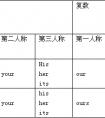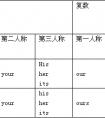用所给动词的适当形式填空。1. Daniel, ___________(not talk) in class. 2. My brother______ (be) born in 1990 in Qidong.3. Tom, with his classmates, often ____-七年级英语
②指“嗅、闻”的动作时,实义动词,可用于进行时态。
The girl is smelling the flower.这姑娘正在闻那朵花。
③smell指“含有……气味”,“发出……气味”等事物性质时,半系动词,无进行时态。
The dinner smells good.这饭菜闻起来真香。
2.系动词的时态与形容词的比较级连用的问题。
某些含有变化意义的动态系动词如get, become, grow, turn等的进行时态可与形容词的比较级连用,表示渐进过程,其意思是“越来越……”。例如:
He is growing taller and taller.他长得越来越高了。
Our life is getting better and better.我们的生活是越来越好了。
The things are getting worse.情况是越来越糟了。
3.所有半系动词的被动语态要分情况讨论。
英语中某动词在作系动词用时,无被动语态,而作实义动词用时,才有被动语态,二者不可混为一谈。例如:
不能说:
The apple is tasted good.
(因为taste此时是系动词,“尝起来”之意,指的是苹果的性质,无被动语态)
但我们可以说:
The apple is tasted by me.这苹果被我尝了一下。
(taste此时指“尝一尝”这一动作,有被动语态)
因此,在平时的英语教学和学习之 ,要有意注意半系动词在具体的语言环境中到底是系动词用法还是实义动词用法,要注意区分、识别。
4.瞬间动态系动词能否与时间段连用的问题
英语中某些表示瞬间意义的系动词不能与“for+时间段,since+时间点,how long until+时间,by + 时间,so far”等直接连用。例如:
①不能说:He has become a teacher for 2 years.
应改为:He has been a teacher for 2 years.
②不能说:He has turned writer since 3 years ago.
应改为:He has been a writer since 3 years ago.
或It is three years since he turned writer.
③不能说:He got angry until his child came back home.
应改为:He didn’t get angry until his child came back home.
5.系动词能接几种表语(从句)
系动词除了接adj.\n.\prep.短语,某些adv.以外,还可接以下几种表语形式:
①能接as if/as though表语从句的系动词有:look(看起来),smell(闻起来),sound(听起来),feel(觉得);appear(显得),seem(似乎)。例如:
It looks as if we are going to have snow.看样子天要下雪了。
He looked as if he had just stepped out of my book of fairy tales.
他看来好像刚从我的童话故事中走出来似的。
She seemed as if (though) she couldn’t understand why Laura was there.
看来她好像不能理解为什么劳拉呆在那儿。
It sounds to me as though there’s a tap running somewhere.
我好像听到某处水龙头流水的声音。
She felt as if her head were splitting.
她仿佛觉得她的头要裂开了。
The river appeared as if enveloped in smog.
那条河好像笼罩在烟雾之中。
It seems as if it were spring already.
好像已是春天了。
②可用于“It+系动词+that从句”结构的有:seem, appear, 不可用be, look。如:
It seemed that he had made some serious mistakes in his work.
好像他在工作中犯了严重错误。
It appeared that he was talking to himself.
好像他在自言自语。
③能用不定式作表语的系动词有:be, seem, get, look, appear, prove, grow.
Her job is to look after the children.
她的工作是照料孩子们。
He seems not to look after the children.
他好像不是她的父亲。
She looks to be a young girl of twenty year-old.
她看起来像是一个20岁的年轻姑娘。
He didn’t appear to dislike it.
看不出他憎恨此事。
My advice proved to be wrong.
我的建议证明是错误的。
He will grow to like this work gradually.
他会逐渐喜欢这个工作的。
④能与there连用的系动词有:be, appear, seem.
There appeared to be only one room.
那儿好像只有一个房间。
There seems(to be)no need to go.
似乎没有必要走。
6.能用两种否定形式的系动词有两个:seem, appear.
举例说明:
It doesn’t seem that we can get our money back.= It seems that we can’t get our money back.
He seems not to be her father.= He doesn’t seem to be her father.
The baby doesn’t appear to be awake.= The baby appears not to be awake.
7.后接作表语的过去分词可构成系表结构
能构成系表结构的系动词通常有两个:第一个是常见的be(is, am, was等);第二个是get,口语中常用。
当二者作系动词用时,它们均表示一种存在状态,而不表示被动动作;当二者作助动词用时,后接作谓语的过去分词构成被动语态。
Be + P.P常可以用get + P.P.来代替,但是并不是be系动词总是可以用get来代替。Get + P.P.系表结构常用于以下两种情况:
1)表示偶然的、突发性的、意想不到的被动动作的结果或状态。
Last night I got caught in the downpour.昨夜我被雨淋了(表示意想不到)
The new car got scratched.新车给刮坏了。(表突发性)
2)表示对自身所作的事。如get dressed, get lost等。
John got injured while playing football last Saturday.约翰上周星期六踢足球时受了伤。
They got married last month.他们上个月结婚了。
另外,要注意区分系表结构与被动语态结构的用法。
考点名称:现在进行时
- 现在进行时:
表示现在或当前一段时间正在进行的动作。可以表示有计划的未来,也就是用现在进行时表示将来。
现在进行时的构成是:
主语+be+v.ing〔现在分词〕形式
例如:He is writing on the desk. 现在进行时的构成:
主语+be+v.ing〔现在分词〕形式
第一人称单数I+am+ing.
第一人称复数We+are+ing.
第二人称单(复)数 You+are+ing
第三人称单数 He(She,it)+is+ing
第三人称复数 They+are+ing
肯定句:主语+be(is/am/are)+现在分词
否定句:主语+be(is/am/are)+not+现在分词
一般疑问句:be(is/am/are)+主语+现在分词
特殊疑问句:特殊疑问词+相应be动词+主语+现在分词+Sth?
间接引语中改为过去进行时。
变化规则:
1.直接+ ing(例:sleep+ing 变sleeping)
2.去掉不发音的e+ing(例:bite-e+ing 变biting)
3.重读闭音节,以辅音字母加元音字母加辅音字母结尾的词,要双写尾字母再加ing(例:swim+m+ing=swimming)
4.以ie结尾的重读闭音节,变ie为y+ing (例:die-dying lie-lying)
5结尾为c且c读作/k/时,在结尾加k再加ing,如picnic-picnicking现在进行时与一般现在时的区别:
(一)现在进行时表示动作的暂时性,而一般现在时表示动作的习惯性和经常性
I am watching TV now. (暂时性)
I watch TV every day. (经常性)
(二)现在进行时可表示短暂性动作,而一般现在时表示长久性动作。
Lucy is living in Beijing.(短时间居住)
Lucy lives in Beijing. (长久性居住)
(三)现在进行时表示的动作可带有感情色彩,而一般现在时所表述的动作通常是事实。
You’re always forgetting the most important things. (责备)
He is always helping others. (赞扬)
He often helps others. (事实)
(四)有些动词不能用进行时,know, understand, love, like, hate, wish, want, think, hope, have, believe, agree, hear, see, notice,等等。
这些动词通常用一般现在时表示说话时发生的动作。
I have a lot of friends here.
She wants to buy a new bike.
现在进行时用法注意:
1.进行时中,并不是所有的动词都要使用正在进行时。
例如一些表示状态和感觉的动词,一般不用进行时态,而是用现在一般时表示。
这些动词往往是等表示情感状态、知觉认识、愿望或短暂性的动词。
例如:see(明白),know, want, like, hear, have(有), think, hope, hate等。
I hear someone singing. 我正听见有人唱歌。
Do you see anyone over there? 你看到那里有什么人吗?
What does he think of it? 他觉得这怎么样?
如果这些词使用正在进行时态,句子带有某种感情色彩。例如:
Are you seeing someone off? 你在给谁送行吗?
They are hearing an English talk. 他们在听一个英语报告。
2.现在进行时还有另外一种含义,即它们能表达即将发生的事情,相当于一般将来时。
有些动词从结构来看是现在进行时,但却是表示将要发生的事,而不表示动作现在正在进行。
这些动词往往是一些表示位置移动变化的动词:arrive, come, do, get, go, have, leave, meet, play, return, see, spend, start, stay, wear, work等。
We are leaving on Friday。我们星期五出发。
Are you going anywhere tomorrow?你明天准备去哪儿?
A foreign guest is giving a lecture this afternoon。今天下午一个外国客人将给我们作报告。
Are you staying here till next week? 你打算在这里呆到下个星期吗?
在表示将来的情况下,特别是be going to do sth. 这种结构,已经没有多少“去”的意思了,几乎就是用来表达“将要、打算”做什么事情。例如:
It is going to be rather cold tomorrow。明天很可能非常冷。
- 最新内容
- 相关内容
- 网友推荐
- 图文推荐
| [家长教育] 孩子为什么会和父母感情疏离? (2019-07-14) |
| [教师分享] 给远方姐姐的一封信 (2018-11-07) |
| [教师分享] 伸缩门 (2018-11-07) |
| [教师分享] 回家乡 (2018-11-07) |
| [教师分享] 是风味也是人间 (2018-11-07) |
| [教师分享] 一句格言的启示 (2018-11-07) |
| [教师分享] 无规矩不成方圆 (2018-11-07) |
| [教师分享] 第十届全国教育名家论坛有感(二) (2018-11-07) |
| [教师分享] 贪玩的小狗 (2018-11-07) |
| [教师分享] 未命名文章 (2018-11-07) |






